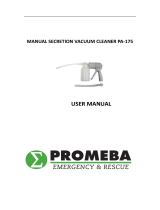Page is loading ...

GENERAL DIRECTIONS FOR USE
These instructions apply to the Resp-O2™
Closed Suction Tracheostomy Catheters
Pediatric/Adult Catheters
10 FR–16 FR
Tracheostomy: 30.5 cm (12 inches)
T-Piece version • Double Swivel Elbow version (DSE)
INTENDED USE:
The Closed Suction Tracheostomy Catheter is
intended for suctioning and removal of secretions from
the respiratory tract of ventilator dependent patients.
PRECAUTIONS:
1. Inspect package prior to use. Do not use product
if package has been damaged or opened.
Non-sterile contents may cause infection.
2. Inspect the quality of the sleeve. Do not use if
sleeve has been damaged.
3. The Closed Suction Tracheostomy Catheters are
intended to be used for 24 hours, change
catheter if soiled or damaged during use.
4. Do not re-sterilize, reuse, or reprocess. Single
patient use only. Rx only.
5. Cap on T-piece version must be removed for
initiating of continuous flow therapy. Failure to
remove cap may result in serious injury or death.
6. Select optimal size of catheter, recommended
that the catheter utilize no more than half the
inner diameter of the airway.
7. The closed suction tracheostomy 30.5 cm (12
inches) catheters length is to be used on
tracheostomy patients only. If used on an
endotracheal patient, ineffective suction may
result. Do not use endotracheal closed suction
54 cm (21.3 inches) length on a tracheostomy
patient, mucosal damage may result.
8. Insure that excess fluid does not enter the Heat
and Moisture Exchanger (HME) during lavage or
rinsing of the catheter. The HME fluid in the HME
may increase the resistances.
9. Follow appropriate suction guidelines. Many
experts suggest suctioning should last no more
than 10-15 seconds and actual duration of
negative pressure should be no more than 5-8
seconds per episode.
10. Always withdraw the catheter until the black
marking stripe is visible in the sleeve, this will
confirm the catheter is out of the airway.
Catheters left in the airway may increase airway
resistance.
11. Use appropriate regulated vacuum levels.
Guidelines suggest -80 to -120 mm/Hg. (-10.7 to
-15,9 kPa).
12. Always use caution and good clinical judgement
as to ventilator modes. Settings may require
adjustment based on the Practitioner findings
during suction procedure.
13. Metered Dose Inhaler (MDI). The MDI adapter on
the T-piece version is located on the T-piece
opposite the ventilator circuit connection point.
The MDI adapter on the Double Swivel Elbow
(DSE) version is located just proximal to the
ventilator circuit connection point. Confirm MDI
port is capped.
14. Place the thumb valve in the locked position
when not in use, this prevents inadvertent
activation of suction.
15. T-Piece version: The internal volume of patient
end adaptor is 14 mL, the internal volume of a
flex adaptor is 23 mL.
Double Swivel Elbow version: The internal
volume of patient end adaptor is 7.7 mL, the
internal volume of a flex adaptor is 33 mL.
16. The closed suction catheter is DEHP free.
17. The closed suction catheter are not MRI safe.
SET UP:
1. Select appropriate catheter size.
2. Attach thumb control valve to suction tubing.
3. Depress and hold thumb control valve and
simultaneously adjust vacuum pressure to
desired level.
4. Release control valve and attach catheter
between the patient and the ventilator circuit.
SUGGESTED SUCTION PROCEDURE:
1. Unlock the thumb control valve.
2. Stabilize the catheter and tracheostomy tube by
firmly holding the T-piece or elbow with one hand
and inserting the catheter into the tracheostomy
tube by advancing the catheter between the
thumb and forefinger of the opposite hand.
Advance catheter to the desired depth.
3. Activate suction by depressing the thumb
control valve while gently withdrawing the
catheter. Stop when the black marking stripe on
the catheter is visible in the sleeve.
4. Release the thumb control valve.
5. Repeat steps 1 to 4 above as needed.
PATIENT LAVAGE INSTRUCTIONS:
1. For tracheostomy patient, advance the catheter
3 cm to 4 cm (1.5 to 2 inches) into the
tracheostomy tube.
2. Instill desired amount of saline or preferred fluid
into the lavage port.
3. Advance catheter to desired depth and follow
the above suggested suction procedure.
CATHETER IRRIGATION INSTRUCTIONS:
1. Confirm the black marking stripe on the catheter
is visible in the sleeve or the black catheter tip is
in the cleaning chamber.
2. Attach vial or syringe to the irrigation port.
3. Slowly instill saline or established fluid while
depressing the thumb control valve
simultaneously.
4. Continue to irrigate until catheter is clear.
5. Remove vial or syringe and replace cap on
irrigation port.
6. Lock the thumb control valve by lifting the top of
the valve and rotate 180 degrees to the locked
position.
METERED DOSE INHALER (MDI) (NOT INCLUDED):
1. Uncap the MDI port and attach the MDI canister
to the port, use care to avoid discharge of
canister when connecting.
2. Support the canister during activation.
3. Flanges on each side of the MDI port add
additional support during activation of the
canister.
4. Dose as appropriate.
5. Remove canister and cap port upon completion
of administering the prescribed medication.
THUMB CONTROL VALVE:
1. The thumb control valve can be locked to
prevent inadvertent suctioning, to lock lift white
part of the thumb control valve and rotate 180
degrees.
2. To unlock, repeat the action above.
DAY STICKER USAGE:
Observe the “Change of Day” sticker, replace
catheter accordingly.
1. Apply the appropriate day sticker to the thumb
control valve.
Example: If the closed suction catheter was opened
on Sunday, place the Monday sticker on the thumb
control valve.
R200811
/





